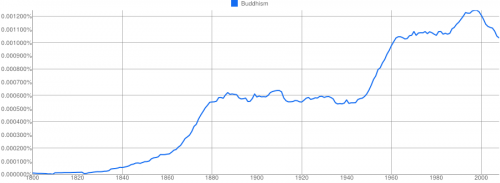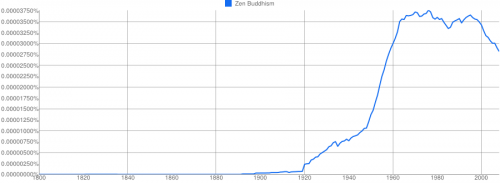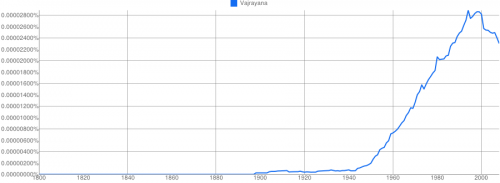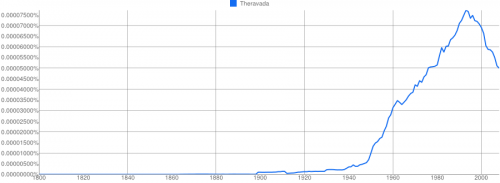Statistical Decline of Buddhism?
Statistical Decline of Buddhism?
By Indrajala (Jeffrey Kotyk)
In June of 2011 Ven. Dhammika on his blog reported that statistics in Singapore show over ten years from 2000 to 2010 the number of Buddhists dropped from 42.5% to 33.3%. He also noted that similar trends are to be found in Korea, Hong Kong and Taiwan. I think the same thing can be said for Japan. While nominally people might identify as Buddhist, or even as a Shinto adherent, most people only walk into temples when someone has died or they're out visiting a historical site as a tourist.
It has been suggested that as Buddhism is transmitted into the western world a kind of "Western Buddhism" might very well become a major component of the global Buddhist population. There is of course good reason for this given the statistics available which clearly have shown an interest in Buddhism in the English speaking world. Google Ngram Viewer displays the following graph when we search for "Buddhism":
After World War II we can see a sharp increase in the use of the word "Buddhism" before it stabilizes for a few years. After 2000 it curiously shows a decline and this is also reflected on Google Trends:
This shows a declining frequency of searches for "Buddhism" relative to the total number of searches on Google. Both seem to reveal a declining interest in Buddhism in the English speaking world. Even if we look for something specific like "Zen Buddhism" there is also a notable plateau followed by decline after 2000:
The term "Vajrayana" also reveals a decline:
Finally we should look at how "Theravada" appears:
This all seems to show a peak in the late nineties followed by a sharp decline.
One thing that could possibly explain this is that as www.culturomics.org explains "the best data is the data for English between 1800 and 2000." Still, as Google Trends shows above there has been a decline in the frequency of searches for "Buddhism", so this probably reflects in the Ngram Viewer as well. Even if it is premature to announce a decline, it is quite possible a plateau in interest has occurred, which is easily seen to have happened for three decades with "Buddhism".
So, what to make out of all this? As the graphs above demonstrate after World War II there was a sharp increase in interest in Buddhism and particular schools of it as scholars and practitioners alike wrote works on the subject matter, though it is possible after 2000 a plateau or even decline has been occurring.
If this is correct, then it might indicate that the purported widespread interest in Buddhism in the West was a passing trend. This is not to say it is in terminal decline, but the popular interest could be at a plateau as settled communities mature and there is less general interest in the exotic Asian religion of Buddhism.
Nevertheless, in Asia Buddhism has been on the decline for many decades. In the last century communist regimes from Mongolia through China down through SE Asia decimated Buddhist communities. Singapore has fewer self-identifying Buddhists than before. When I was in Leh in Ladakh I was told by people there that there are less Buddhists there now than there were before, with the local population now being half Muslim. In a few generations Buddhists will be a minority in Leh and elsewhere in Ladakh. It could easily go extinct there within the century in my estimation. In Korea there are now more Christians than Buddhists in the country, not to mention the violent antagonism against Buddhism by some protestant groups.
Interestingly Buddhism has long predicted its own demise. Even the Buddha is on record as saying that his Dharma would eventually be forgotten by the world, as was the case before when the Buddhadharma of the past Buddha Kāśyapa was lost. Fortunately we are told that in the distant future the Buddhadharma will be rediscovered by Maitreya Buddha. An excellent work on all this is Jan Nattier's Once Upon a Future Time: Studies in a Buddhist Prophecy of Decline.




